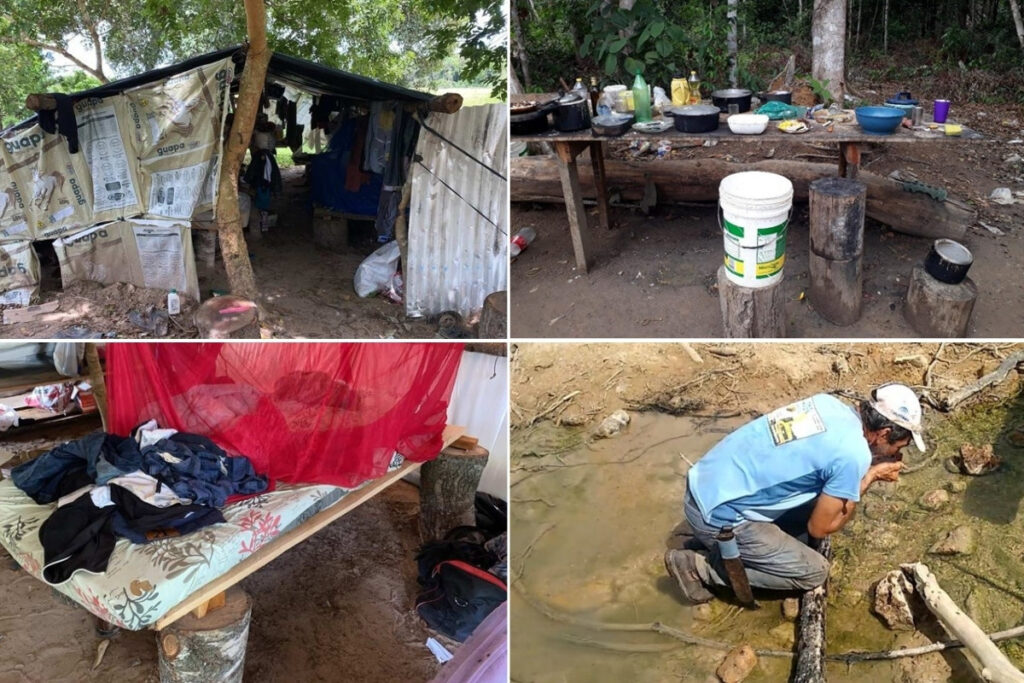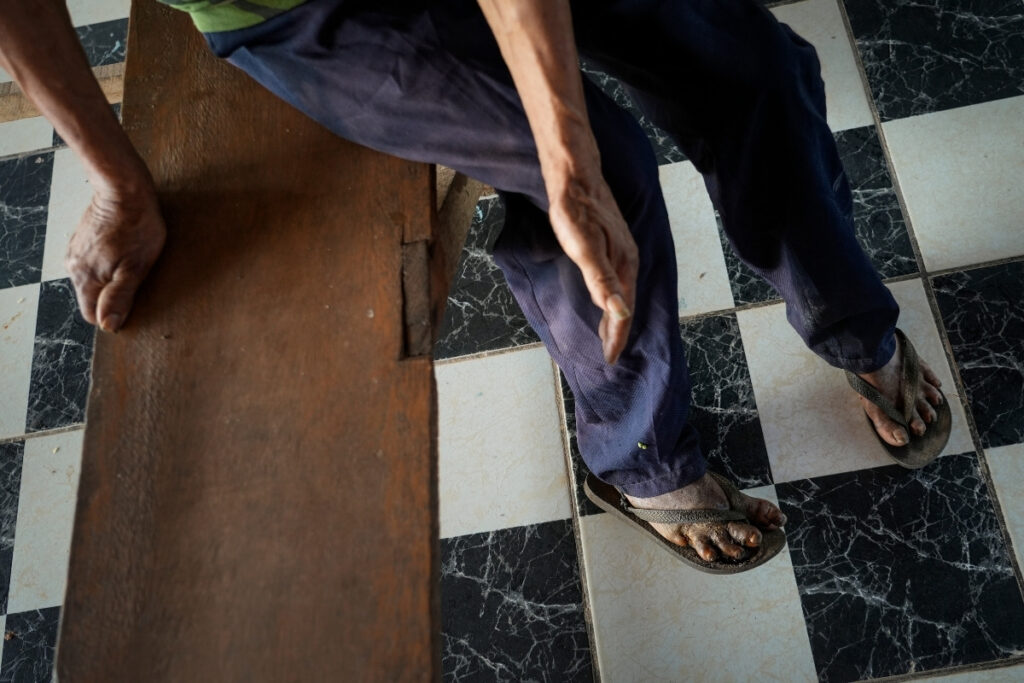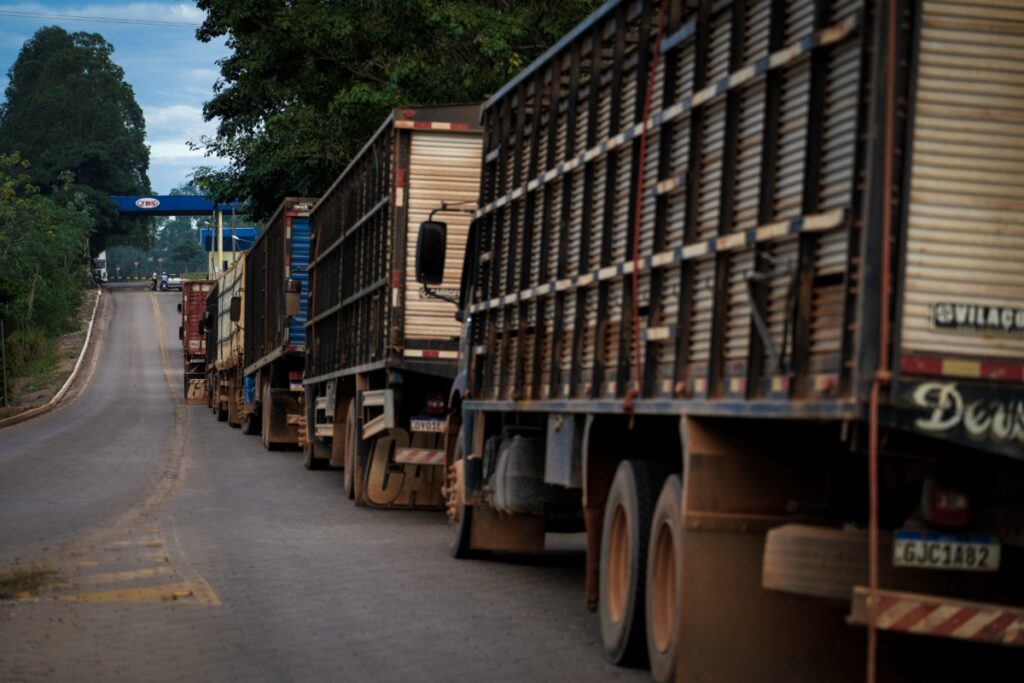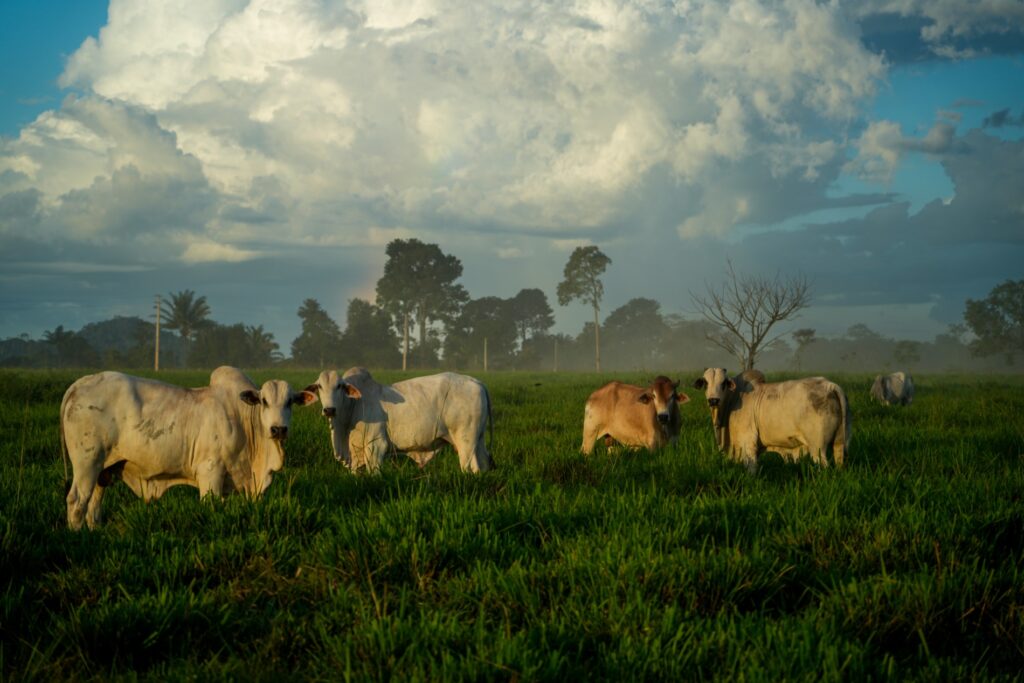CATTLE RANCHERS FINED for subjecting workers to conditions analogous to slavery on cattle farms are part of the supply chain of Brazil’s largest meatpacking plants: this is revealed by new cases identified by Repórter Brasil.
The relationships between eight ranchers caught using slave labor between 2018 and 2023 and industry giants are detailed in the report “Under the Radar – How cattle ranchers caught employing slave labor are part of the supply chains of Brazil’s largest meatpacking companies,” published this Thursday (9).
In addition to the ranchers fined for slave labor, two other producers were identified for raising cattle illegally within the Krikati Indigenous Land in Maranhão. Among the ten producers mentioned in the report, three have also been fined or have faced embargoes for illegal deforestation.
By analyzing animal transit records from 2018 to 2025, it was possible to identify that cattle from these producers were transferred to farms supplying meatpacking plants or sent directly to slaughterhouses such as JBS, Minerva, Marfrig, and Frigol, the four largest in Brazil, and others with regional operations, such as Masterboi, Rio Maria, Pantanal, and Frigosaj.
The investigation was conducted in partnership with Climate Rights International (CRI), an international organization that investigates environmental and human rights violations. In its report, also published this Thursday (9), CRI highlights how major global fashion and footwear brands are linked, through their leather supply chains, to the meatpacking plants mentioned in Repórter Brasil‘s investigation.
Slave Labor in the Sector
The concept of “condition analogous to slavery” is described in Article 149 of Brazil’s Criminal Code, which states that it is a crime “to reduce a person to a condition analogous to slavery by subjecting them to forced labor, exhaustive working hours or degrading working conditions or by restricting, by any means, their movement due to debt owed to the employer or agent.”
Workers who carry out tasks such as clearing pastures for cattle breeding and later constructing fences and corrals are exposed to degrading conditions and are often subjected to slave labor. This is the assessment of Maria Gabriela Costa Grandi, a prosecutor from the MPT (Labor Prosecutor’s Office) in Pará.

“One violation leads to another,” summarizes Costa Grandi. “For the entrepreneur to deforest, they will need to seek informal labor, and usually, these workers are subjected to conditions analogous to slavery. They set up their tents in the forest, sleep there, eat there, and continue deforesting,” she adds.
Between 1995 and 2024, 17.3 thousand workers were subjected to conditions analogous to slavery in the livestock sector, according to data from the MTE (Ministry of Labor and Employment), compiled by Repórter Brasil. Throughout the historical series, livestock farming accounted for 26% of the number of slavery victims in Brazil.
Changes After Being Added to the Dirty List
One of the cases mentioned in the report involves cattle rancher Vanúbia Silva Rodrigues. In October 2023, she was included in the Dirty List of slave labor, a register maintained by the federal government with the names of employers fined for this practice.
His inclusion in the Dirty List occurred after an inspection carried out in July 2022 identified two workers subjected to conditions analogous to slavery on one of her farms, Fazenda Presente de Deus, in São Félix do Xingu, in the state of Pará, in the Brazilian Amazon.

At the time, Repórter Brasil revealed that the producer was a JBS supplier, the world’s largest meat producer. After the investigation’s inquiry, the company stated it would block the rancher from its supplier list.
However, after being added to the Dirty List, Fazenda Presente de Deus continued to supply cattle for fattening to at least two direct suppliers of JBS.
In one case, animal transit records accessed by the investigation show that Fazenda Presente de Deus sent 144 cattle in December 2023 to Fazenda Pé do Morro, in Água Azul do Norte, also in Pará. Five days later, the property issued GTAs (Animal Transit Guides) to transfer the same number of animals, with the same sex and age characteristics, to the unit of JBS in Redenção, in Pará.
In response to questions from Repórter Brasil, Vanúbia Silva Rodrigues stated only that she had signed a TAC (Conduct Adjustment Term) with the MPT, which, according to the rancher, was fully complied with. JBS, in turn, did not comment on specific cases and merely stated that “all producers listed on the Dirty List of slave labor are blocked.”
The full responses from the ranchers and companies cited in the investigation can be read in full at the end of the report.
Under the Radar
Cattle ranching, which involves stages like breeding, rebreeding (starting after weaning), and fattening, can take place on different properties. But only those ranchers who transfer cattle to slaughter, the direct suppliers, are fully mapped and monitored by the slaughterhouses.
A large part of the so-called “indirect suppliers” falls off the radar of the monitoring conducted by the companies themselves and the audits carried out to ensure compliance with the Meat TAC (TAC da Carne, in portuguese). Launched in 2009, the Meat TAC is an agreement between the MPF (Federal Prosecutor’s Office) and meatpacking companies operating in six of the nine states of the Legal Amazon, aimed at blocking the purchase of cattle from illegally deforested areas after 2008, overlapping conservation units or Indigenous lands, and using labor under conditions analogous to slavery.

“The monitoring does not look at the indirect supplier,” explains Lisandro Inakake, coordinator of the Boi na Linha program, an initiative created in 2019 by the nonprofit organization Imaflora, in partnership with MPF, to accelerate the implementation of commitments made by the sector. “It is a challenge we face regarding monitoring capacity, which depends on traceability, and also a challenge regarding blocking rules [of sector agreements]. Today, we still don’t have rules for [indirect] suppliers.”
“The main challenge is tracking this cattle. We do not have individual control to show where this cattle is coming from,” corroborates Igor Spindola, a federal prosecutor in Pará.
Individual vs. Corporate
Another monitoring gap in the sector highlighted by experts interviewed by Repórter Brasil is the simple blocking of suppliers after their inclusion in the Dirty List, considering only the individual’s name and CPF (Individual Taxpayer Registration) – without checking their family or business relationships.
A tent in a decommissioned chicken coop and a wooden shack were the accommodations for four workers rescued from slave-like conditions on the Pedra Preta and Futura farms, adjacent areas in São Félix do Xingu, inspected in June 2018. Auditors found rotten meat stored, which was used for the workers’ consumption, according to information from the inspection report accessed by the investigation.
At the time, rancher Marcos Borges de Araújo was fined for keeping four workers in slave-like conditions on the property. According to animal transit records analyzed by Repórter Brasil, he supplied cattle to JBS units in Redenção and Santana do Araguaia, both in Pará, between June 2018, the month of the fine, and August 2023.
The cattle came from various farms of the rancher in Pará. Among them, properties that received cattle for fattening from Fazenda Pedra Preta, where the slave labor was flagged.
The farm is owned by Agropecuária Vale dos Sonhos, a company of the Araújo family, which is controlled by the holding company Agro Investment Group Participações Societárias S/A. A 2022 lawsuit, accessed by Repórter Brasil, shows that Marcos Araújo is married to the co-director of the holding.

After his name was added to the Dirty List in April 2024, the employer stopped sending cattle in his name to JBS. Starting in March 2024, cattle from Fazenda Pedra Preta began to be supplied to JBS’s unit in Santana do Araguaia in the name of Agropecuária Vale dos Sonhos, according to GTA data accessed by the report.
Through his lawyers, Marcos Araújo claims that “he was not responsible for the workers subject to inspection” on Pedra Preta and Futura, that “he did not subject any worker to conditions similar to slavery,” and that he is appealing the fine in court. Agropecuária Vale dos Sonhos stated that it has no legal relationship with rancher Marcos Borges de Araújo and operates “100% within the law.” JBS did not comment on specific cases. The full responses can be read at the end of the report.
Son is a Direct Supplier
Another case detailed in the investigation is that of Fazenda Alto Guaporé, in Vila Bela da Santíssima Trindade, in Mato Grosso, Brazil’s largest cattle-raising state. The property is owned by Tomas Andrzejewski. In July 2022, seven workers were rescued in conditions analogous to slavery from the property.
The group slept in camping tents installed in the shade of a fig tree and bathed using buckets and improvised containers with water from a water truck. The rancher was added to the Dirty List in October 2024.
Two months after being added to the list, Fazenda Alto Guaporé sent cattle for fattening to Fazenda Flor do Cerrado II, in Cáceres, Mato Grosso, according to GTA records accessed by the investigation. The records show that the purchase of the cattle from Alto Guaporé was registered under the name of Alex Kohls Andrzejewski, Tomas’s son. In January 2025, Fazenda Flor do Cerrado II supplied cattle to Marfrig’s unit in Várzea Grande, also in Mato Grosso. Along with JBS and Minerva, Marfrig is also one of Brazil’s leading beef producers.

Through his lawyer, Tomas Andrzejewski stated that he repudiates “any exploitative behavior towards workers” and that he was unaware of the workers’ conditions at Fazenda Alto Guaporé, as he took over the property three months before the rescue. He also claims that the sales contract with his son was formalized in August 2024, before his inclusion on the Dirty List, which occurred in October.
Alex Kohls Andrzejewski told Repórter Brasil that the cattle received from Alto Guaporé were a different breed from those sent to Marfrig.
Marfrig stated that Tomas Andrzejewski is blocked from its supplier list and that it conducted prior checks with the Dirty List and found no issues related to Alex Kohls Andrzejewski or Fazenda Flor do Cerrado II. The full responses can be read at the end of the report.
Geographical Location Blocking
Daniel Azeredo, federal prosecutor and one of the creators of the Meat TAC, suggests that blocking operations found using slave labor should also be done by geographical coordinates, encompassing the entire property.
“The lists work by name and CPF, and they are very easy to violate. Control must be by geographic location, by area, latitude, longitude, because then it’s not possible to change. That locality is blocked,” he analyzes.
Read the full report: UNDER THE RADAR – How cattle ranchers caught employing slave labor are part of the supply chains of Brazil’s largest meatpacking companies
Leia também

